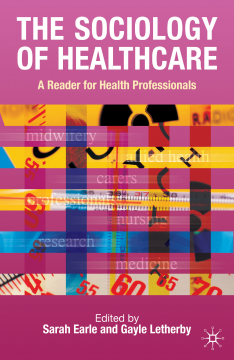
Additional Information
Book Details
Abstract
A comprehensive collection of classic and contemporary readings in the sociology of health. The Sociology of Healthcare will stimulate debate, reflexive practice and critical thinking in applied sociology and is aimed at the teaching and learning needs of both lecturers and students.
SARAH EARLE is Lecturer in Health and Social Care at The Open University, UK. She has published in the areas of the sociology of health and health care education and the sociology of reproduction and sexuality.
GAYLE LETHERBY is Professor of Sociology at the University of Plymouth, UK. Her interests are eclectic and include issues of method, methodology and epistemology, reproductive and non/parental identities, working and learning in higher education.
A comprehensive collection of classic and contemporary readings in the sociology of health. The Sociology of Healthcare will stimulate debate, reflexive practice and critical thinking in applied sociology and is aimed at the teaching and learning needs of both lecturers and students.
The editors, both eminent academics in health and social care, have put together an interesting collection of 28 classic and contemporary readings... The papers are short, but do stimulate reflection and critical thinking.' - Nursing Standard
Table of Contents
| Section Title | Page | Action | Price |
|---|---|---|---|
| Cover\r | Cover | ||
| Half-Title\r | 1 | ||
| Title | 3 | ||
| Copyright | 4 | ||
| Dedication | 5 | ||
| Contents | 7 | ||
| Acknowledgements | 10 | ||
| About the Editors | 13 | ||
| Thinking Sociologically about Health and Healthcare | 14 | ||
| Part I Sociological Perspectives on Health and Healthcare | 19 | ||
| Introduction | 19 | ||
| 1 The Political Economy of Health and Healthcare | 21 | ||
| 2 The Medicalisation of Reproduction | 31 | ||
| 3 The Social Role of Medicine | 41 | ||
| 4 The Sociological Construction of Medicine | 51 | ||
| 5 The Sociological Imagination | 58 | ||
| Part II Making Sense of Health and Healthcare | 67 | ||
| Introduction | 67 | ||
| 6 Quantitative and Qualitative Approaches | 69 | ||
| 7 Historical Data for Health Inequalities | 84 | ||
| 8 Practice-Based Evidence | 94 | ||
| 9 ‘Traditional’ and ‘Emancipatory’ Research | 108 | ||
| 10 Women Respondents in Health Research | 116 | ||
| 11 Ethics and Ethics Committees | 125 | ||
| Part III Health and Healthcare: Inequalities and Diversity | 139 | ||
| Introduction | 139 | ||
| 12 The Politics of Victim Blaming | 141 | ||
| 13 The Determinants of Geographical Inequalities in Health | 154 | ||
| 14 Children Reflecting on Health | 167 | ||
| 15 Gender and Women’s Health | 177 | ||
| 16 Understanding Ethnic Inequalities in Health | 189 | ||
| Part IV Health and Healthcare: Bodies, Minds and Emotions | 199 | ||
| Introduction | 199 | ||
| 17 The Body, Medicine and Death | 201 | ||
| 18 ‘Enhancing’ the Body | 210 | ||
| 19 Humour and Illness | 221 | ||
| 20 Anorexia as Disability | 232 | ||
| 21 ‘Dirty Work’ | 243 | ||
| 22 Emotion Work in Midwifery | 253 | ||
| Part V Power, Professions and Practice in Health and Healthcare | 263 | ||
| Introduction | 263 | ||
| 23 The Characteristics of a Profession | 265 | ||
| 24 The Professionalisation of Complementary and Alternative Medicine | 276 | ||
| 25 The Feminisation of Dentistry | 287 | ||
| 26 Occupational Boundaries in the Operating Theatre | 295 | ||
| 27 Choosing to be Childfree | 303 | ||
| 28 The Internet and the Doctor–Patient Relationship | 311 | ||
| Index | 323 |
